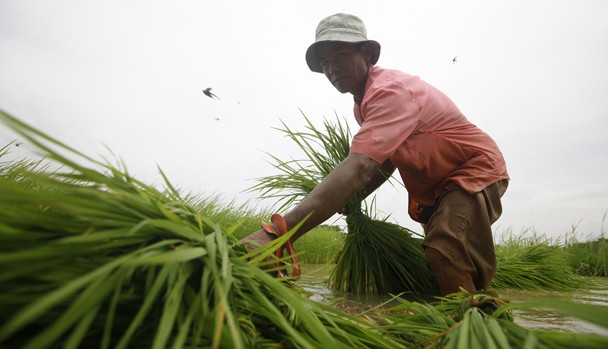LOI LAW, Kachin State — When five farmers in this village started planting rice in a small plot in late June, they used younger seedlings and organic fertilizer, and transplanted the seedlings individually. Fellow villagers thought they had gone mad as their methods go against the grain.
“They asked us, ‘What are you doing? Are you crazy?’” Nyo Nyo Htway, a farmer who worked on the pilot plot, recalled with laughter.
By mid-October, when the paddies planted using the traditional method had not yet ripened, those in the experimental plot were golden and heavy with grains. The villagers who once scoffed at them now want to know their method, says Nyo Nyo Htway.
“The average yield in this village is 40 baskets, but we’ll get the equivalent of 70 baskets an acre from this plot,” said Aung Zay Ya, the instructor who taught them the new method.
The so-called system of rice intensification (SRI) originated in the 1980s in Madagascar. Farmers in about 50 countries, including India and the Philippines, have adopted it.
Proponents say SRI is suited to smallholdings as it reduces costs with less seed and irrigated water required, increases yield and is more environmentally sustainable. They also say SRI plants are generally healthier and better able to resist stresses such as drought, flooding, and storm damage.
The teaching of SRI is part of the first Farmer Field School set up in Loi Law by Swiss Aid and local organization Aung Sett Kyar, with funding from the Livelihoods and Food Security Trust Fund (LIFT), a multi-donor fund managed by the United Nations.
The pilot plot, less than half an acre, and the farmers’ own fields are the classrooms. The school program lasts six months – the entire rice-growing season. The teacher Aung Zay Ya is a farmer from a neighboring village who graduated from a training course conducted by the Metta Development Foundation, one of Burma’s largest non-governmental organizations, which started the farmer field schools in 2001.
The students attend half-day sessions every week and learn about subjects such as seed selection, soil fertility, and waste management.
Organic: Cheap and Effective
Kachin state in Burma’s far north is known for its natural resources – including minerals, jade and forests – but farming is still a major source of income.
At first, the student farmers in Loi Law were not convinced about the new methods. They had heard that organic fertilizers and pesticides prepared with readily available ingredients such as manure, chilies and soap powder were cheaper and better for the soil, but they had never tried making them.
“There was nobody to really show us how they work so we didn’t believe it. Now we can see it with our own eyes so we’re willing to learn,” said Nyo Nyo Htway.
Kyaw Lwin, one of 10 farmers currently attending another field school in nearby Loi Sunt, agreed.
“We don’t have much money, so it’s great when we’re taught how to strengthen the plant with organic hormones or how to treat the plant if it turns red using easy, inexpensive methods,” said Kyaw Lwin, who owns an eight-acre farm. “We could see a big difference.”
The villages, a two-hour drive from the state capital Myitkyina on excruciatingly bad roads, are in Moe Kaung Township. The subsistence farmers here rely on a single rain-fed crop during monsoon as they do not have irrigation systems and face water shortages in the summer.
The yields are low due to poor soil and bad quality seeds. Add crippling interest rates – 100 percent when borrowing rice and up to 15 percent when borrowing money – and it is not unusual for them to sell the paddy to repay debts.
“A rice farmer having to buy rice from the market – it happens all the time,” said a female farmer, shrugging her shoulders.
Challenges: Landless and Risk-Averse
Donors like LIFT are hoping that improved agriculture techniques like SRI will help break that cycle of poverty, but challenges remain because many farmers do not own land or are at constant risk of losing their farms because current laws do not recognize customary land tenure systems as are practiced by the country’s ethnic groups.
Land is a politically and economically sensitive issue in a country where 70 percent of the country’s 60 million population depends on agriculture. All land is owned by the government, but farmers are given land use or tillage rights.
Over 50 years of iron-fisted military rule, there were numerous land acquisitions, like those suffered by Loi Sunt villagers who said the army took a few hundred acres of their land in the early 1990s.
Burma’s reformist government has been working on land registration for farmers, but critics say the system is not completely transparent and that land acquisitions for infrastructure, development or large-scale agricultural projects continue unabated.
The ongoing conflict between the army and ethnic Kachin rebels, which has displaced about 100,000 people across Kachin and neighboring Shan state, has also affected projects aimed at helping local communities.
With formal credit inaccessible and unofficial lenders charging exorbitant interest rates, it is little wonder farmers here are risk-averse.
“Next year, we will use SRI on perhaps one or two acres out of 10,” said Aye Ei Aung, a farmer student in Loi Sunt.
SRI results in higher savings on seeds and water but requires much more manpower, which is expensive, she said. She is not sure the increase in yield will be enough to offset the higher labor costs.
“I know SRI is good for farmers with less acreage, but it’s not economical if you have more than five acres,” she said. “Besides, there aren’t enough laborers in the village.”
















